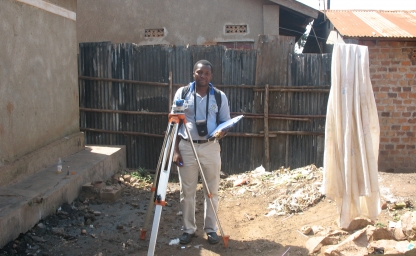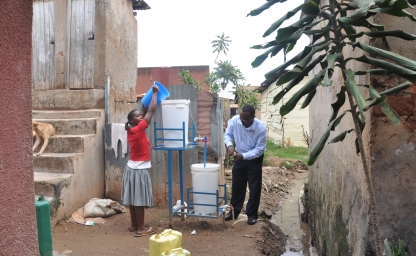Stakeholder Workshop
To disseminate our research findings and engage the various stakeholders to share experiences on the provision of sanitation in slums, on 20 March 2012, we organized a one day stakeholder workshop. Main theme of the workshop was "Sanitation in slums".
Presentations during the SCUSA stakeholder workshop
- The role of KCCA in provision of sanitation in Kampala slums (Keynote address and official opening)
Dr. Makanga H.K.M. (Director Health services), KCCA - Sanitation technologies for slums and implications of pathogens in the environment
Alex Katukiza, IHE Delft - Sanitation-related pollution of groundwater and surface water in a slum environment
Philip Nyenje, IHE Delft - Onsite sanitation and groundwater pollution in urban areas
Dr. Callist Tindimugaya, Directorate of Water Resources Management, Ministry of Water and Environment - WATSAN services for the urban poor
Eng. Paddy Twesigye, National Water and Sewerage Corporation - Public Private Partnership involvement in slum sanitation
Dr. Charles Niwagaba, SSWARS/GIZ - Market demand study for faecal sludge use in Kampala
Teddy, FaME Research Project/Makerere University - Catalyzing self-sustaining chains in informal settlements
Kenan Okurut, 3K SPLASH research project Makerere University
NOTE: Please contact Jan Willem Foppen to obtain copies of the presentations
The workshop was well attended and stakeholders included service providers, local governments, NGOs, researchers and the beneficiary community.
List of stakeholders attending the workshop
- Kampala Capital City Authority (KCCA) City authority
- Kampala Integrated Environmental Management Project (KIEMP),Project
- Ministry of Water and Environment, Uganda (MWE), Government
- Ministry of Health (MOH), Government
- Community Integrated Development Initiatives (CIDI),Local NGO
- WaterAID Uganda (WaterAID), NGO
- District Local government (DLG), Government
- Plan Uganda, International NGO
- Landlords, tenants and local leaders in the study area
- Sustainable Sanitation and Water Renewal Systems (SSWARS), Local NGO
- National Water and Sewerage Corporation (NWSC), Government
- Research Projects (FaME, 3K SAN, MSI), Makerere University
- Association of Cesspit emptiers, Private sector
- United Nations High Commission for Refugees, Uganda (UNHCR), UN
- Local media (PEAU, UBC TV, Newvision), Media
- Research institutions (Makerere University, IHE Delft), Research institutions
- German International Development Cooperation (GIZ), Development organization
Summary
During the workshop, there was ample time to discuss sanitation issues in the slums of Kampala. The following is a summary of the most important challenges mentioned by the participants:
What are the real sanitation problems in the slum?
- Too many open pit latrines instead of lined ones, or good septic tanks.
- Uncontrolled disposal of solid waste.
- High cost of building septic tanks or upgrading open pits, no system to collect solid waste.
- High cost of emptying pit latrines.
- No or ill management toilet visit fee collection system. No system to save collected money in a bank account or through a micro finance organization.
- Lack of competition in the sector emptying the cesspits with trucks.
- No availability of vacu-tucks, the motorized small scale version of the cesspit emptying device, which could reach any house to empty pit latrines and would provide competition to the expensive private sector truck operators.
- Lack of effective public operators and governance structures. KCCA considers emptying to be 'privatized' and only serves government organizations.
- No enforcement of legislation concerning open pit latrines, or the obligation to empty the tanks regularly and no strict control on poor practices such as perforating or letting the toilet overflow during the rainy season.
Role of sanitation projects
There have been numerous sanitation projects carried out in slums within the Kampala area, but their impact has been limited. According to the experts technologies are not the problem, since most of them are available. Some of the reasons mentioned by the experts for sanitation projects to fail are (random order):
- Institutional fragmentation at the level of the government;
- No proper governance structure around the toilets at the level of the neighborhood;
- No systematic fee collection and then putting the money in a blocked account;
- The tendency to build simple toilets and to move on as a donor;
- Even donors went for the much cheaper open pit latrines instead of building lined toilets or providing septic tanks;
Future research gaps include (randomly ordered):
- What is the role of the slum in its catchment? How can we reduce the polluting effects of urban slums downstream in the catchment. Are there possibilities to introduce new post-slum large scale effluent treatment technologies in order to reduce downstream pollution?
- How do slum dwellers finance the construction, maintenance and emptying of toilets and sceptic tanks?
- Are micro finance institutions allowed and interested in collecting savings?
- Why is the formal financial sector not interested in financing toilets or tanks or setting up an emptying account (with a higher rate of interest because the money stays for a two year period).
- Institutional paralysis in Kampala: The failure of so many institutions responsible in one way or another for sanitation and often endowed with substantial budgets to solve the sanitation issue in the slums is a problem that deserves to be researched in more detail.


